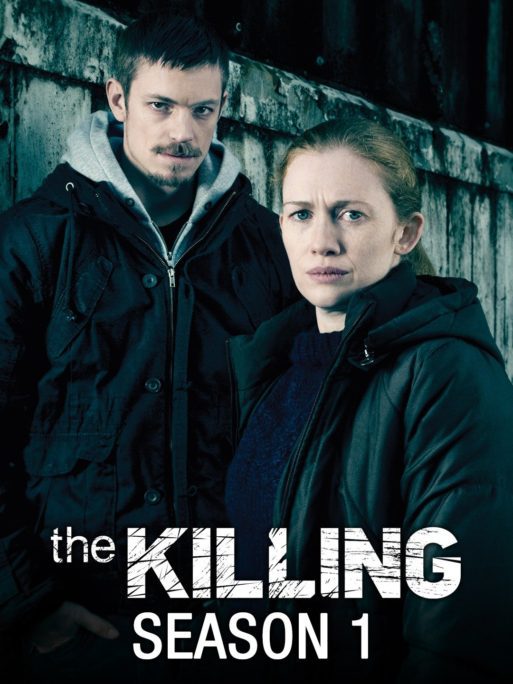
In today’s world of reality TV, gothic horror and sitcoms, it’s rare to find a network television show that explores the human condition in any depth. Thankfully, the subscription streaming service Netflix has stepped in to fill that void, giving us some of the best storylines and acting that we’ve seen on television in a very long time. My current favorites include “Bloodline” and “House of Cards.” But by far the most compelling drama I have seen in recent years is the mini-series “The Killing,” seasons one and two.
“The Killing” is a gritty police procedural drama set in Seattle, Washington. Featuring a largely unknown cast, it follows Detectives Sarah Linden, played by Mireille Enos, and Stephen Holder (Joel Kinnaman) as they track the killer of a teenage girl. Although the series went on for two more seasons, it was the first 26 episodes that left the deepest impression on me.
The series pilot opens by introducing us to Stan and Mitch Larsen, a middle-class couple whose far-from-perfect, yet nonetheless happy, life is evident from the start. Stan and Mitch have three children: two boys, Tom and Denny (who appear to be around 11 and 7 years old), and Rosie, 17. Shortly after the film begins, we learn that Rosie, who was supposed to have been staying at a friend’s house while her family went on a camping trip, has disappeared. Not long after that, her murdered body is found in the trunk of a car, submerged in a lake.
What ensues is a gut-wrenching and sometimes devastating look at the stark reality of grief. We see Mitch (played exquisitely by Michelle Forbes) and Stan (Brent Sexton) as they come face to face with the knowledge that Rosie is dead. Stan rages; Mitch crumbles. Neither of them can comprehend the enormity of what they have learned — that their beautiful daughter was killed in cold blood. Their naked grief is almost too difficult to watch.
Themes of Grief and Loss
As the series continues, a number of plots and subplots emerge. But the stories are largely character driven, with themes of grief and loss throughout. We learn that Sarah was a foster child who is unable to form lasting relationships as an adult. We discover that Darren Richmond (played by Billy Campbell), a politician who the police believe is complicit in Rosie’s murder, once attempted suicide while mourning the loss of his wife. Later, Richmond grieves for his own shattered life after he is struck by a bullet and paralyzed from the waist down.
But the common thread woven through “The Killing” and its complex web of characters is the emotional devastation that Rosie’s death leaves in its wake.

The cast of “The Killing”
Credit: tvzap.kataweb.it
A Family Comes Apart
In the immediate aftermath of the murder, Mitch is virtually nonfunctional. Stan tries to hold the family together, going about “business as usual” with the help of Mitch’s sister, Terri (played by Jamie Anne Allman). But the boys are asking questions, and it soon becomes apparent that the charade has to end. Stan explains to the boys that Rosie is dead. And when Denny asks, “When is she coming back?” his older brother screams at him, “That means she’s never coming back!” and dissolves into tears. It’s a scene that speaks volumes to the grief of children, who are so often left to fend for themselves following a traumatic death.
As the hunt for Rosie’s killer continues, we see the ripple effect of her death on those who knew her well, including a teacher who befriended her, her best friend and Stan’s good friend, Belko. No one, it seems, is immune to the repercussions.
Eventually, Mitch, unable to regain her equilibrium, leaves the family in an attempt to escape her pain. Meanwhile, Stan’s frustration and helplessness slowly turn to anger and, eventually, explosive rage.
I would be doing the reader a disservice if I revealed too much more about this powerful drama. Suffice it to say that “The Killing” is as real and raw as any exploration of grief and loss that I’ve encountered before or since. The acting and writing are impeccable. And there are enough twists and turns to keep the viewer engaged from beginning to end. What’s more, the show accomplishes this without a hint of the graphic violence that permeates so much of what we see on the TV screen today.
If you have ever grappled with the sudden death of a loved one, you will almost certainly identify with the Larsens and the enormity of their loss. Hopefully, you will also find some solace in the fact that, in the end, they come together as a family. And with Rosie’s help, they even manage to achieve some measure of peace.

 “The Killing” Seasons One and Two by Søren Sveistrup
“The Killing” Seasons One and Two by Søren Sveistrup


 “Help Me, Helen”
“Help Me, Helen”
 Recovering Cremation Remains After the Los Angeles Fires
Recovering Cremation Remains After the Los Angeles Fires
 “As Tears Go By” by Marianne Faithfull
“As Tears Go By” by Marianne Faithfull














